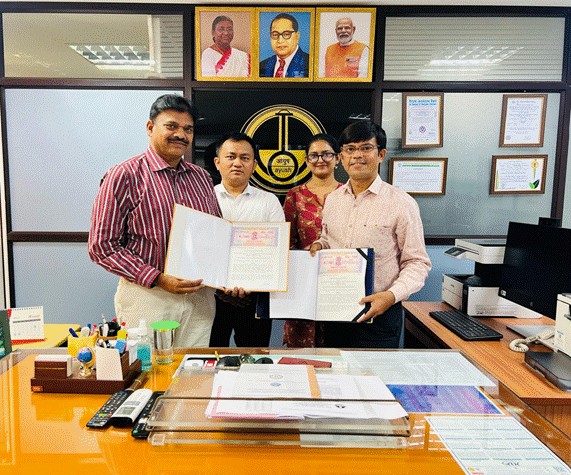MARCH 11:In a significant step towards advancing Ayurveda research in diabetes management, the Central Ayurveda Research Institute (CARI), Kolkata, under the Central Council for Research in Ayurvedic Sciences (CCRAS) Ministry of Ayush, has signed a Memorandum of Understanding (MoU) with the School of Natural Product Studies (SNPS), Jadavpur University, Kolkata. The agreement, formalised at CARI, Kolkata, marks the beginning of a collaborative research project titled “Evaluation of Vidangadi Lauham, a Classical Ayurvedic Formulation in the Management of Diabetes in Experimental Animals.”
In a significant step towards advancing Ayurveda research, the Central Ayurveda Research Institute (CARI), Kolkata, under the Central Council for Research in Ayurvedic Sciences (CCRAS), Ministry of Ayush, has signed a Memorandum of Understanding (MoU) with the School of Natural Product Studies (SNPS), Jadavpur University, Kolkata. The agreement was formalised at CARI, Kolkata, and marks the launch of a collaborative research project titled “Evaluation of Vidangadi Lauham, a Classical Ayurvedic Formulation in the Management of Diabetes in Experimental Animals.”
This research project holds immense potential in the field of Ayurveda, aiming to establish a robust scientific foundation for the use of Vidangadi Lauham in diabetes management. The study will involve biophysical characterisation and analysis of the biological activity of the medicinal plants involved in this Ayurvedic formulation. In doing so, it will contribute significantly to the preservation and restoration of India’s rich medicinal plant heritage.
The findings of this research are expected to be crucial in the development of high-quality, safe, and effective Ayurvedic formulations to combat diabetes and its associated complications. The study also underscores the need for a comprehensive database to validate the health benefits of medicinal plants, ensuring their credibility within the global healthcare system. The ultimate goal is to popularise Ayurvedic formulations as natural health-promoting agents and foster broader acceptance of traditional medicine on the global stage.
With diabetes becoming a growing concern worldwide, this research initiative has the potential to lead to the development of an Ayurvedic formulation with minimal to no side effects. This could ultimately improve public health and enhance the quality of life for millions of individuals.
The MoU signing ceremony was attended by officials from both institutions, including Dr. G. Babu, Director of CARI, Kolkata; Dr. Anupam Mangal, Assistant Director (Pharmacognosy); Dr. Lalrin Puia, Research Officer (Pharmacology); Dr. Sharad D. Pawar, Assistant Director (Pharmacology); and Dr. Rahul Singh, Research Officer (AEP). Representing SNPS, Jadavpur University, was Prof. (Dr.) Pallab Kanti Halder, Director and Principal Investigator of the project.

















